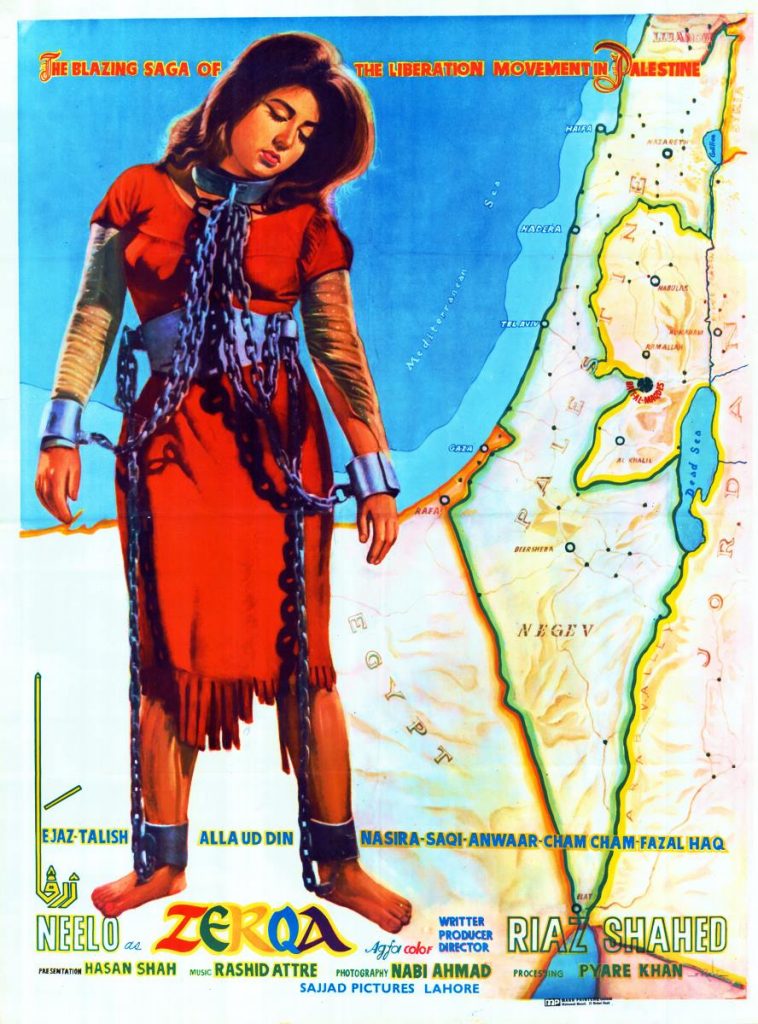Zerqa, directed by Riaz Shahed, is regarded as a landmark film in Pakistani cinema. Set in 1948-9, the film looks at Zerqa (Neelo), the daughter of a freedom fighter, who joins the Arabs in trying to free Palestine after her father is killed by the Israelis and who becomes a martyr for the cause of Palestine. Sounds really good, sounds bloody interesting but …
Zerqa was a huge, huge success in Pakistan – one of their most popular films ever – and was thought to be something different from the run of the mill films offered to the Pakistani public. However, barring its subject matter, the treatment is anything but different and that is where for all its noble and sincere intents, Zerqa ultimately fails to make our satisfactory viewing, at least today. It also ends up treating the issue of the Palestinian struggle rather superficially and strictly on the surface in terms of black and white. And as was typical of Pakistani cinema of its time, in terms of its narrative flow, the film, much too loud and obvious, comes up woefully short in terms of aesthetics and technique, especially when compared to Indian films at the time. But admittedly, it also manages to be watchable in a strange, perverse sort of way.
And to be fair to Zerqa, it’s not all downhill. I have to admit that certain sequences are pretty effective in their own way. Zerqa’s torture and her subsequent forced dance in chains does leave an impact and Neelo acquits herself comparatively quite well here; some of the scenes involving the Israeli Major David, played by Agha Talish, also do raise the film a notch or two. His character is reasonably well fleshed out to reveal a human dimension to him rather than making him out to be a typical, cardboard cutout villain. In one of the film’s few high moments, we see and feel his helplessness as he is unable to break Zerqa down in the interrogation and sense his amazement that a woman could be so tough. The character of his wife, Angela, who questions him and tries to be his conscience, is also well-thought out, even if she cuts a huge elephantine figure in the dresses she is made to wear!
The performances, like those from across the border at the time, are uniformly loud and theatrical. In what is believed to be her most memorable role, Neelo, in fact, looks too old for the title role. Her acting, too, has not held up well as the years have gone by. That she went on to win the Nigar Award for Best Actress and that this is regarded as her greatest ever performance and a milestone act in Pakistani cinema, speaks volumes for the quality of Pakistani cinema and the acting style prevalent in ‘Lollywood’ then. Ejaz Durrani as her fiancé, also part of the freedom movement, has a strictly supporting role with which he is unable to elevate. In any case, though a top star of Pakistani cinema, he was never rated a great actor, mostly a lucky one, as most of his films, especially his Punjabi films with Firdous, were extremely successful at the box-office. Only Agha Talish really stands out in the cast and he does manage create his moments in the film, which are also some of the film’s best bits. But that’s also because as mentioned earlier, the script helps him tremendously as Major David is by far the best fleshed out character in the film.
The music by the late Rashid Attre and his son Wajahat Attre is in keeping with the film’s milieu. The pick of the songs is undoubtedly Raqs-e-Zanjeer brilliantly rendered by Mehdi Hassan. The song has its own history. Neelo had been asked to dance in front of a foreign dignity by the Governor of West Punjab. But she refused. The Governor had her abducted and forcefully brought her to his residence where she was made to perform. Following the traumatic event, Neelo attempted suicide taking a pile of sleeping pills. She was visited in the hospital by director Riaz Shahed and revolutionary poet and left-wing activist, Habib Jalib. Shahed offered her marriage and overcome on seeing this, Jalib penned the historic lines, Tu Kay Nawaqif-e-Aadab-e-Ghulami Hai Abhi, Raqs Zanjeer Pehan Kar Bhi Kiya Jata Hai (You are not aware of the protocols of a ruler’s court, Sometimes one has to dance before them even in chains). These words, after some minor modifications, were then included in the film. Among the other songs, Main Phool Bechne Aayi, Raqs Kare Parwana and Mera Dil Tha Beqarar are well composed if not unduly spectacular.
Zerqa was the first ever diamond jubilee Urdu film in Pakistan and ran in Karachi for a staggering 101 weeks. It also picked up Nigar Awards for Best Film, Best Director, Best Actress, Best Script, Best Editor, Best Male Playback Singer (Mehdi Hassan), Best Lyricist (Habib Jalil) and Best Art Direction. However, it has not been able to withstand the cruel flow of time and appears extremely dated today, even if its cause is even more relevant today.
Urdu, Drama, Color
Header picture courtesy Omar Ali Khan.


